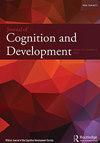儿童对书籍反直觉信息的追求
IF 1.6
2区 心理学
Q3 PSYCHOLOGY, DEVELOPMENTAL
引用次数: 0
摘要
本文章由计算机程序翻译,如有差异,请以英文原文为准。
Children’s Pursuit of Counterintuitive Information in Books
ABSTRACT For decades, developmental psychologists and educators have emphasized that learning about counterintuitive phenomena may be a critical driving force for cognitive development. Thus far, little is known about the specific content that children seek to enrich their knowledge. Using a novel book-choice paradigm, we directly examine children’s preference to engage with media that contains more mundane vs. more counterintuitive content. Children ranging from 3- to 8-years (N = 174), from the U.S. and Canada, were presented with pairs of books about animals. The two books in each pair were visually identical aside from their printed title. One book in each pair was described as presenting a fact that (according to validation data on children’s and adults’ beliefs in these facts) was relatively intuitive, and the other book was described as presenting a fact that was relatively counterintuitive. The youngest participants (3–4 years) demonstrated no preference in selecting books with intuitive vs. counterintuitive facts about animals, whereas older children (5-years onward) demonstrated an increasing preference for counterintuitive content. Combined with validation data on children’s and adults’ intuitions about the focal facts, these data suggest that children’s preference to seek information that adults deem counterintuitive (at least in the domain of biology) increases with age as a function of changes in the strength of children’s intuitions about what is possible.
求助全文
通过发布文献求助,成功后即可免费获取论文全文。
去求助
来源期刊

Journal of Cognition and Development
Multiple-
CiteScore
4.00
自引率
0.00%
发文量
29
期刊介绍:
The Journal of Cognition and Development is the official journal of the Cognitive Development Society (CDS). Some CDS members are concerned with basic research or theory; others focus on policy issues and practical applications. The range of interests includes cognitive development during all stages of life, and we seek to understand ontogenetic processes in both humans and nonhumans. Finally, their interests encompass typical as well as atypical development, and we attempt to characterize both biological and cultural influences on cognitive change and continuity.
 求助内容:
求助内容: 应助结果提醒方式:
应助结果提醒方式:


